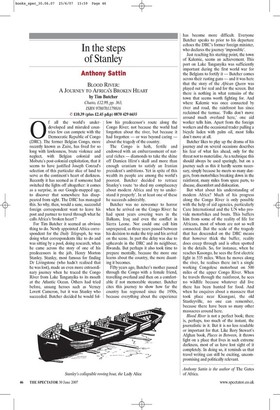In the steps of Stanley
Anthony Sattin BLOOD RIVER: A JOURNEY TO AFRICA'S BROKEN HEART by Tim Butcher Chatto, £12.99, pp. 363, ISBN 9780701179816 © £1039 (plus £2.45 p&p) 0870 429 6655 f all the world's underdeveloped and misruled countries few can compete with the Democratic Republic of Congo (DRC). The former Belgian Congo, more recently known as Zaire, has lived for so long with lawlessness, brute violence and neglect, with Belgian colonial and Mobutu's post-colonial exploitation, that it seems to have justified Joseph Conrad's selection of this particular slice of land to serve as the continent's heart of darkness. Recently it has seemed as if someone had switched the lights off altogether: it comes as a surprise, in our Google-mapped age, to discover that somewhere has disappeared from sight. The DRC has managed this. So why, then, would a sane, successful foreign correspondent want to leave his post and partner to travel through what he calls Africa's 'broken heart'?
For Tim Butcher it seemed an obvious thing to do. Newly appointed Africa correspondent for the Daily Telegraph, he was doing what correspondents like to do and was sitting by a pool, doing research, when he came across the story of one of his predecessors in the job, Henry Morton Stanley. Stanley, most famous for finding Dr Livingstone (who hadn't realised that he was lost), made an even more extraordinary journey when he traced the Congo River from Lake Tanganyika to its mouth at the Atlantic Ocean. Others had tried before, unsung heroes such as Verney Lovett Cameron, but it was Stanley who succeeded. Butcher decided he would follow his predecessor's route along the Congo River; not because the world had forgotten about the river, but because it had forgotten — or was beyond caring — about the tragedy of the country.
The Congo is lush, fertile and endowed with an embarrassment of natural riches — diamonds to take the shine off Damien Hirst's skull and more than enough uranium to satisfy an Iranian president's ambitions. Yet in spite of this wealth its people are among the world's poorest. Butcher decided to retrace Stanley's route 'to shed my complacency about modern Africa and try to understand it properly'. In at least one of these he succeeds admirably.
Butcher was no newcomer to horror when he arrived on the Congo River: he had spent years covering wars in the Balkans, Iraq and even the conflict in Sierra Leone. Nor could one call him unprepared, as three years passed between his decision to make the trip and his arrival on the scene. In part the delay was due to upheavals in the DRC and its neighbour, Rwanda. But perhaps it also took time to prepare mentally, because the more one learns about the country, the more daunting it becomes.
Fifty years ago, Butcher's mother passed through the Congo with a female friend, travelling overland and then on a comfortable if not memorable steamer. Butcher cites this journey to show how far the country has regressed since the 1950s, because everything about the experience has become more difficult. Everyone Butcher speaks to prior to his departure echoes the DRC's former foreign minister, who declares the journey 'impossible'.
Just reaching his starting point, the town of Kalemie, seems an achievement. This port on Lake Tanganyika was sufficiently important during the first world war for the Belgians to fortify it — Butcher comes across their rusting guns — and it was here that the story of the African Queen was played out for real and for the screen. But there is nothing in what remains of the town that seems worth fighting for. And where Kalemie was once connected by river and road, the rainforest has since reclaimed the tarmac. 'Folks don't move around much overland here,' one aid worker tells him Apart from the foreign workers and the occasional trader pulling a bicycle laden with palm oil, most folks don't move at all.
Butcher likes to play up the drama of his journey and on several occasions describes his fear of what lies ahead, only for the threat not to materialise. As a technique this should always be used sparingly, but on a journey such as this it hardly seems necessary, simply because he meets so many dangers, from motorbikes breaking down in the rainforest, many miles from spare parts, to disease, discomfort and dislocation.
But what about his understanding of modern Africa? Much of his progress along the Congo River is only possible with the help of aid agencies, particularly Care International and the UN who provide motorbikes and boats. This buffers him from some of the reality of life for Africans, most of whom are not so well connected. But the scale of the tragedy that has descended on the DRC means that however thick the buffer, reality does creep through and is often spotted in the details. So, for instance, when he reaches Kasongo, he sees the first electric light in 535 miles. When he moves along the river, he realises there isn't a single working Congolese motorboat on 500 miles of the upper Congo River. When he travels through the rainforest, he sees no wildlife because whatever did live there has been hunted for food. And when he enquires about a massacre that took place near Kisangani, the old Stanleyville, no one can remember, because there have been so many other massacres around here.
Blood River is not a perfect book; there is, perhaps, too much of the instant, the journalistic in it. But it is no less readable or important for that. Like Rory Stewart's Afghan book, Places in Between, it throws light on a place that lives in such extreme darkness, most of us have lost sight of it completely. In doing so, it reminds us that travel writing can still be exciting, uncompromising and politically relevant.
Anthony Sattin is the author of The Gates of Africa.


















































































 Previous page
Previous page